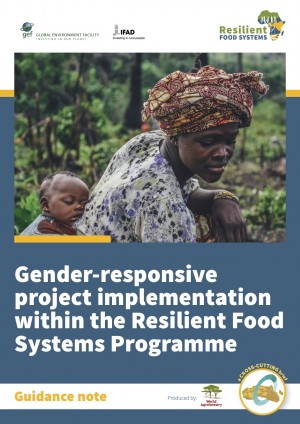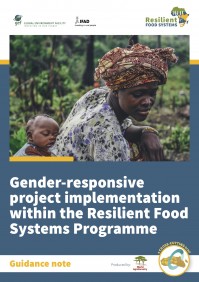Permaculture training brings diversity to Eswatini’s smallholder food systems
15 December 2020
Within the RFS programme, gender is a cross-cutting theme incorporated into the design and implementation of each project. Gender-responsive approaches enable each RFS project to work towards gender equality with regards to access to productive resource and services, employment, and decision-making processes within the agriculture sector.
In sub-Saharan Africa, women represent roughly 50% of the agricultural labour force, yet their productivity levels are lower than men due to unequal access to land, credit, inputs, and extension services. Women also work longer hours, ranging from 12 to 13 hours more per week than men. Ultimately, this disparity between men and women impacts not only women, but the community as whole, undermining agricultural productivity, socio-economic development and food security.
In RFS countries, climate change, land degradation, and biodiversity loss affect men and women differently. Even though women are often the primary providers and caretakers within their household, they often have less decision-making power than men. Power imbalances translate to differences in how resources are distributed within households. Women are more vulnerable to water and food shortages, an imbalance that is exacerbated in regions that are impacted by climate change, land degradation, and extreme weather events. With lower levels of formal education, women also lack the access and skills required for generating alternative incomes that could decrease their reliance on agricultural production for household livelihoods and food security.
IFAD estimates that providing women with the same access to productive resources, skills, tools and technologies as men could increase production on women’s farms by 20-30%. Ensuring women’s equal involvement in community-based sustainable land management and natural resources management has been shown to improve land rehabilitation, reverse desertification, and improve socio-economic conditions within communities.
In line with GEF’s ambition to ensure gender equality and promote women’s empowerment across its operations, RFS aims to close the gender gap in agriculture by integrating gender perspectives and concerns into the preparation, design, implementation, and monitoring and evaluation of agricultural projects and programmes. By integrating considerations of gender equality into each stage of RFS project implementation, RFS is working toward the transformation of discriminatory social institutions and practices. Equal access to resources and opportunities for men and women will support the sustainable improvement of agricultural production, food security, and participation in decision-making processes.
Across the RFS programme, project teams have identified the different needs, roles and responsibilities of women within project sites, as well as opportunities for equal engagement with women. The findings of these assessments have been integrated into project implementation in a variety of ways, including the disaggregation of participation targets by gender in M&E frameworks, strategic partnerships with and capacity development of women’s groups, scaling up access to financing for women, offering subsidies on agricultural technologies and natural resource management assets for women, and a focus on supporting income-generating activities for women.
The RFS Ethiopia project is currently engaging gender experts in the development of a gender-sensitive decision support tool, which allows for easy tracking of socio-economic indicators that have gender-responsive changes over the project period. In Nigeria, the RFS project has forged a strategic partnership with the Women Farmers Advancement Network (WOFAN), convening training workshops for extension workers with a focus on ensuring equal access to extension services for women. In Uganda, the RFS project has made a deliberate effort to ensure equal participation of women and men in extension services, working with clan leaders and elders to mobilise women to engage in the RFS-supported Farmer Field Schools.
Explore the RFS Country Projects to see more examples of how RFS countries are implementing gender-responsive activities.
Stories from the Field
Explore our stories from the field to learn more about how RFS country project teams are implementing activities related to the programmatic theme of Gender.
Relevant resources
We have a growing library of reports, briefs, case studies, media, tools and guidelines. Explore all resources related to gender-responsive approaches to get greater insight into our programme activities.


Gender is a cross-cutting issue within the RFS programme and gender mainstreaming was a major aspect of RFS country projects design. This guidance note is designed to assist country teams to identify the most relevant gender dimensions according to the theme and scope of their project. It also suggests activities, methods and approaches to address those gender dimensions in project implementation. The aim is to ensure that both men and women have equal opportunities to participate in, contribute to, and benefit from the RFS projects.


The Gender and Inclusion Toolbox: Participatory Research in Climate Change and Agriculture is an in-depth, ready-to-use guide for researchers and development practitioners to help uncover important gender and social differences in rural communities. The gender toolbox is the result of a long-term partnership between the CGIAR Research Program on Climate Change, Agriculture and Food Security (CCAFS), World Agroforestry Centre (ICRAF), and CARE International. The Food and Agriculture Organization of the United Nations (FAO) has provided valuable contributions to ensure a high-quality research product.


The GEF Council approved the new GEF Policy on Gender Equality in November 2017. These Guidance Report provides detail on the practical steps and required actions to implement principles and mandatory requirements specified in the Policy with a focus on gender-responsive design, implementation, and monitoring of GEF programs and projects. The target audiences are GEF Agencies and broader GEF partnerships.
The Knowledge Centre is a central platform for sharing resources and information generated by the 12 Resilient Food Systems country projects and Regional Hub.
Within the Knowledge Centre, you can find helpful resources, tools, case studies, and news stories related to the different countries and themes of the Resilient Food Systems programme.